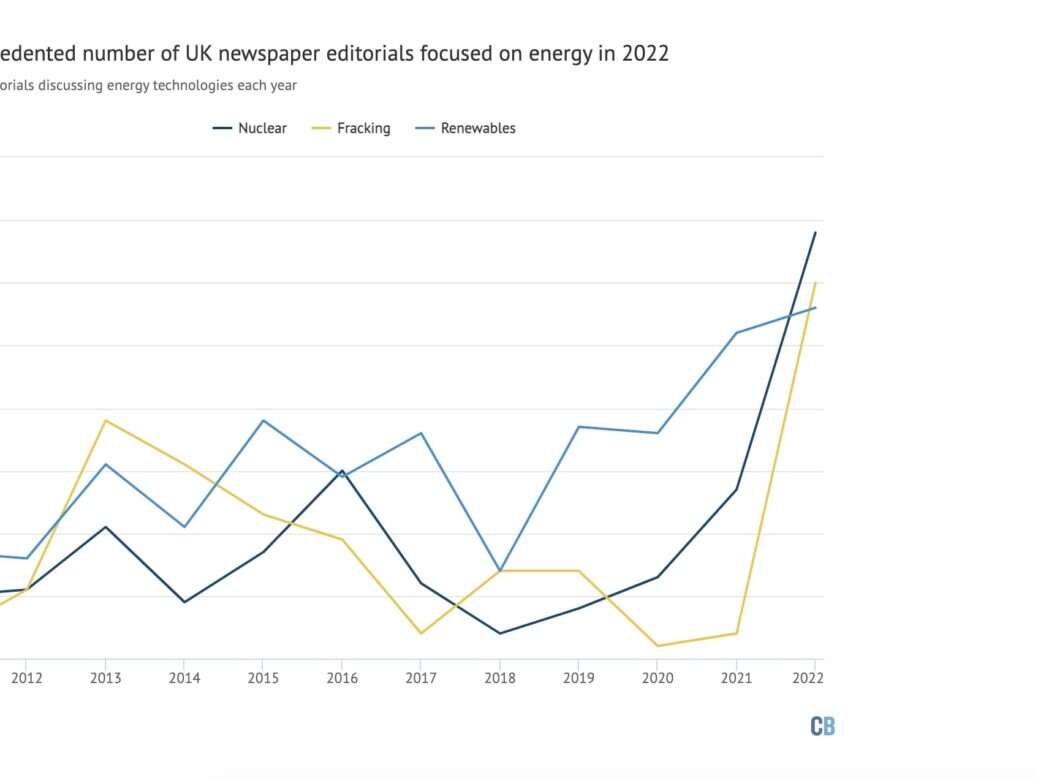
The number of editorials in British newspapers about recommencing fracking grew 1,400% from 2021 to 2022, according to new analysis.
Nuclear power saw a similarly dramatic growth in prominence year-over-year. Meanwhile the number of editorials about renewable energy grew less slowly, and there was a decline in the number of leader articles about climate change in general.
The findings, published by climate science site Carbon Brief, indicate that activist group Just Stop Oil succeeded in its goal of generating press attention.
Carbon Brief last year published analysis showing British newspaper editorials calling for climate action had quadrupled in the three years to 2021.
[Read more: UK newspaper support for action on climate change has surged since 2019]
On Wednesday Carbon Brief and Exeter PhD researcher Sylvia Hayes released an updated analysis incorporating data from 2022. The publication found that of 413 editorials published by national UK newspapers in 2022 covering climate and energy, 149 concerned nuclear power, fracking or renewable energy – more than double the figure in 2021.
Attention on nuclear power, in particular, has accelerated over the past five years. According to Carbon Brief there were four editorials about the energy source in 2018, eight in 2019, 13 in 2020, 27 in 2021 and 68 in 2022.
Not only was nuclear power the most-discussed form of energy generation in UK editorials in 2022, it received more editorials last year than either fracking or renewables have at any point since the period assessed by Carbon Brief began in 2011.

Although it received fewer editorials overall, fracking saw an even sharper increase in attention – jumping from four mentions in 2021’s leaders to 60 in 2022. Renewable energy, meanwhile, received a more modest 56 editorials in 2022, versus 52 in 2021.
All three energy approaches received more editorial mentions in 2022 than in any other year assessed by Carbon Brief.
Alongside the increased attention on fracking, there was an increase among right-leaning papers in support for recommencing the practice in the UK. There were more than twice as many editorials in 2022 actively supportive of fracking (59) as there were in the next highest year, 2013 (23). The Sun and Sun on Sunday alone published 32 pro-fracking editorials in 2022.

Carbon Brief said: “The practice was framed as a way to cut dependence on expensive gas from Russia and other foreign nations. By far the most common theme – appearing in 54 of the 69 editorials that mentioned fracking – was the need for shale gas to satisfy the UK’s energy needs.” (The site was critical of this framing, however, saying shale “would be unlikely to yield significant benefits for either energy security or prices”.)
Approving discussion of nuclear power also grew. The report’s authors said: “In 2022, 46% of the energy-related editorials analysed spoke positively about nuclear power, the highest proportion ever recorded in Carbon Brief’s analysis.”
But the percentage of energy-related editorials in favour of renewables fell from 57% to 38% – and those hostile to it rose from 7% to 15%. Carbon Brief attributed the shifts to right-leaning papers “emphasising the ‘unreliability’ of wind and solar power for providing the UK’s energy needs”.

More broadly, there were 126 editorials in UK papers in 2022 about climate change in general, versus 185 the year before. 2022 was the fourth year in a row that Carbon Brief found no editorials rejecting the existence of climate change or the science underpinning it – although there was an increase in opposition to climate action.
“Criticism was reserved for a handful of pet topics among these right-leaning newspapers,” the authors wrote. “These include the perceived high costs of pursuing climate policies and the ‘eco-idiot’ protesters pushing for more ambitious climate action in the UK.”
This was particularly true of Just Stop Oil, the protest group whose non-violent disruptive tactics – most famously, blocking roads – caught the ire of much of the press.
“If one of the group’s goals was to attract media attention they have been successful. Carbon Brief analysis of the editorial database shows that, in its first year of operation, Just Stop Oil has attracted more outraged editorials in the UK’s right-leaning newspapers than even Extinction Rebellion managed amid its blockades in 2019.”

[Read more: Protections needed for journalists after Just Stop Oil protest arrests, Parliament told]
Email pged@pressgazette.co.uk to point out mistakes, provide story tips or send in a letter for publication on our "Letters Page" blog
